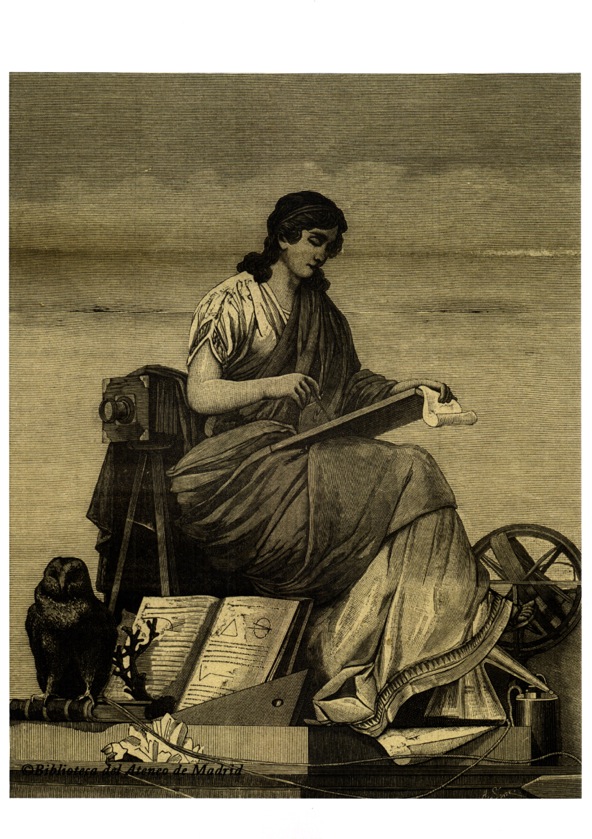A contribution of Rocío Rodtjer
Cover for the 30 November 1890 issue 16 of El Álbum Iberoamericano
Excerpt explaining the cover translated from Spanish:
‘Allegory of the modern industry – Fortuitous were the thoughts of the author when he decided to represent modern industry in the form of a woman. In this way the industry presents a double manifestation of progress by admitting the female sex amongst its collaborators.’
‘Allegory of…’ is a popular motif in European visual art that tends to be embodied by a woman, often having a wardrobe malfunction, representing an abstract concept like ‘war’, ‘peace’ or ‘love’. Yet the lady featured on on the cover of El Album Iberoamericano is not only soberly clothed but also embodying progress, which made it an exciting find. Women and progress are normally not pictured together, particularly not fully clothed women.
As per tradition she is flanked by objects that are related to the concept she incarnates, progress. The owl obviously stands for wisdom, whilst the book propped open next to it shows geometry, with the branch on top of it standing for botany. Other items include a camera, a theodolite representing astronomy, some glass beakers presumably for chemistry, and some cables on the ground that could allude both to electricity and the development of the telegraph.
El Album Iberoamericano was a successful mainstream publication aimed at a transatlantic Spanish female readership founded by Concepción Gimeno de Flaquer in 1890, one of the growing numbers of publications by women for women that started to appear catalyzed by improvements in printing in the nineteenth-century. The expansion of modern mass media provided women with a growing number of venues in which to express themselves, amongst them the many magazines they founded or edited. The press remains one of the most emblematic vehicles of this early modernity, yet ironically, this modern development conspired in the long term to efface female contributions to progress, like the fading yellowing pages of newspapers withering in dusty archives – literally.
Recent developments in scanning technologies have enabled us to search through these preserved memories with greater speed and accuracy, in other words, our own modernity is providing us with the means to assess more comprehensively the remains of past modernities. All of the issues of El Album Iberoamericano have been digitized, so that we can now navigate the exciting cacophony of ideas by women, some of whom were the first females in their family to be literate. Well, not all issues have been digitized, not the one dedicated to the contributions of women to progress. That one still sits, together with the remaining issues of its first publication year, in a great leather-bound book, gathering cobwebs in an archive a stones-throw away from the Spanish parliament. Although it is not listed in the shared Spanish library catalogue – it is only featured in the local index of El Ateneo library where it lives physically. In other words, to find it you already have to know where it is; like women’s contribution to modernity. But once you start searching for it you will find it, and lots of it.

